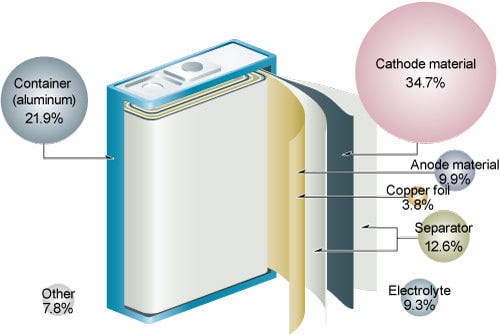Li Ion Battery Materials
Li Ion Battery Materials And Their Advantages

Lithium ion batteries have opened up new opportunities in the field of electrical storage. From handheld electronics to electric vehicles, li ion battery materials have spawned a web of charge storage solutions. The unique thing about these batteries is that they have a very high charge density. Owing to this property, these batteries can hold a higher amount of charge per gram of it. This makes the batteries less bulky than conventional batteries. However, this is not the only benefit of these batteries.
Benefits Of Li Ion Batteries And The Role Of Li Ion Battery Materials
Self-discharge
A nagging issue with conventional rechargeable batteries is that they discharge rapidly. Lithium ion batteries, on the other hand, have a very low self-discharge rate. In fact, the rate is quite low compared even to rechargeable Ni-Cad or NiMH batteries. Typically, it loses around 5% of stored charge for the first 4 hours, but after that this rate comes down to around 1 or 2% per month.
Low maintenance
A major advantage of lithium ion batteries is that they need very low maintenance unlike Ni-Cad batteries which require periodic discharging to ensure occurrence of memory effect. Since li ion battery materials don’t contribute to memory effect, you need not do anything to maintain these batteries unlike others.
No need for priming
Rechargeable cells need priming after the first charge. With lithium ion batteries, this is not required. Priming is needed in other batteries since the electrolyte in these batteries usually settles at the bottom if you keep it idle after buying. This gives rise to inefficient charging and insufficient battery performance. With lithium ion batteries this is not required.
Variety
These batteries are available in a number of varieties. So, you are free to choose a particular technology for a particular application. At the core of this liberty is the variety of materials for li ion batteries. You can get these batteries in a number of attributes which is not possible with any other battery. For a particular application, you may invoke a particular property depending on attributes and cost. While some varieties of lithium ion batteries have a high charge density which is suitable for hand held consumer electronics, others may provide higher current needed to drive heavy duty power tools and electric vehicles.
Materials Used In Li Ion Batteries
A number of materials are used in making li ion batteries. This includes a variety of cathode materials consisting of a variety of metal oxides, anodes made of porous carbon, lithium ion solution etc. Among the cathodes there is Lithium Cobalt Oxides, Vanadium Pentoxide etc. This implies that there are a lot of materials for li ion batteries. The right material depends on the exact use. Manufactures use cobalt in batteries made for hand held electronics where high charge density is the most significant criterion. Cobalt is expensive and toxic and this is why it is not used in every application. Other materials used in lithium ion batteries include copper foils, battery separators, aluminium foils etc.